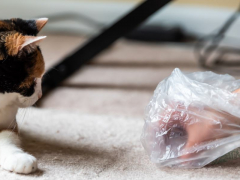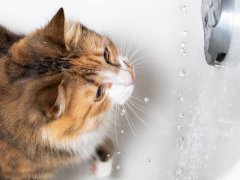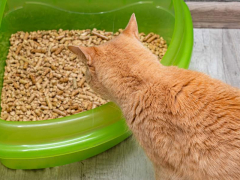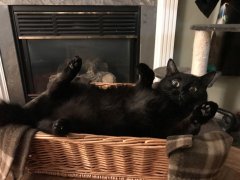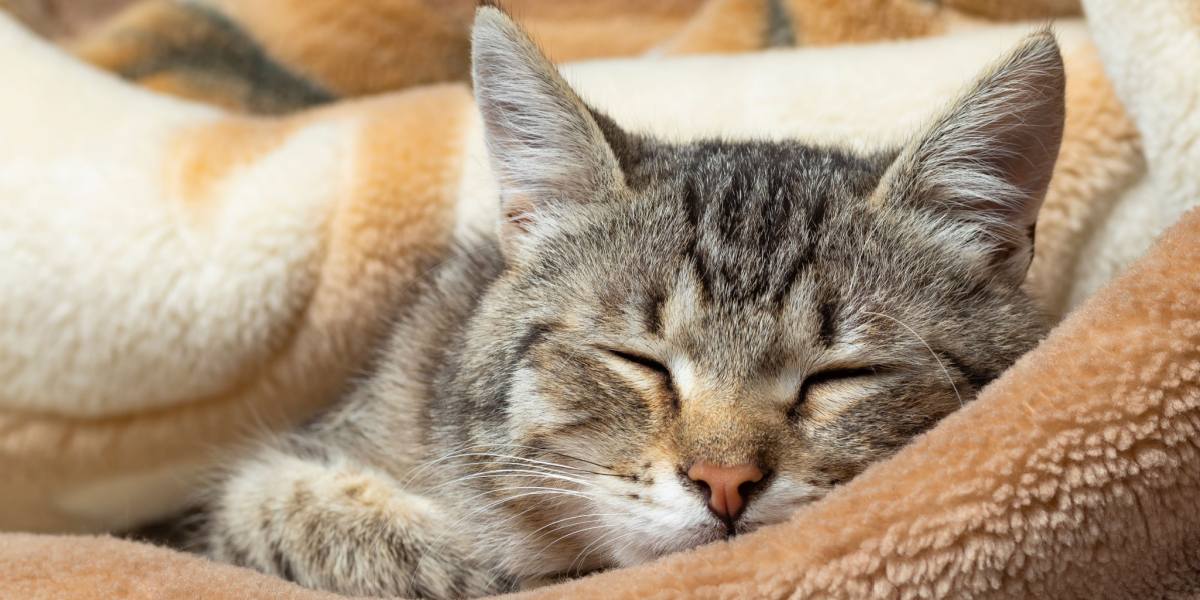
Cat behavior often seems strange if you don’t understand the reason behind it. One such behavior is when cats suckle on blankets or other soft fabrics.
Many pet owners will be able to recall a time when they’ve been cozied up with a blanket, only to be quickly joined by their furry family member, who begins to try to nurse and knead on the fluffy material. Weird, huh? Let’s find out why cats suck on blankets.
Why Do Cats Suck on Blankets?
Sucking on blankets or other warm fuzzy things is a completely natural behavior for your cat. Here’s why your favorite feline might do it:
1. It’s in Their Instinct
During kittenhood, kittens rely on their mothers for everything. They feed from the mother cat by suckling, and this allows them to get the nutrition they need while forming a strong bond with her. It also releases happy hormones like oxytocin and puts them into a bit of a trance-like state, which helps them with relaxation.
When they reach adulthood, they might not feed from their mothers anymore, but it’s still their instinct to suckle and knead when something reminds them of that cozy, warm, safe feeling they got from their mom.
2. It’s Comforting
Cats are very independent creatures, so it’s no surprise that they self-soothe when they’re feeling stressed or poorly. By sucking on a fluffy blanket, they’re able to comfort themselves and make themselves feel a bit better. You might notice that they purr too, which is another method of self-soothing.
3. They Feel Close to You
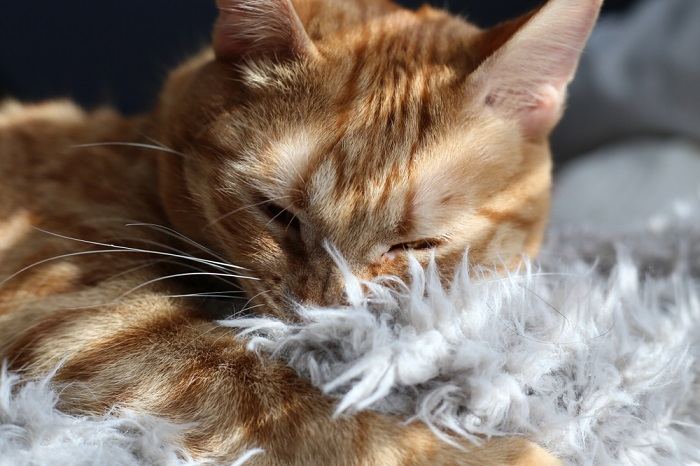
Cats may suck in a blanket when near you because they feel safe and loved in your presence.
Now that you know that sucking on a blanket is similar behavior to nursing from their mother, it’s pretty logical that they reserve this behavior for people that they love. So, if your kitty does this behavior around you, it’s a massive compliment.
It means that your cat feels close to you, that your bond is strong, and they love you. You might be their favorite human and they might see you as a sort of substitute mother. Although this is lovely, if their suckling behavior is excessive they might be suffering from separation anxiety.
4. They’re Scent Marking
Wool sucking is normally accompanied by a cat kneading with their claws. This might be because kittens knead on their mothers’ bellies while they are nursing to stimulate milk production. While they are kneading and nursing on a blanket, they are also transferring their scent onto the blanket.
Cats have lots of scent glands, especially around their face and paws. So, this behavior also serves the purpose of marking their territory and comforting them with their familiar scent.
5. They’re Content
Cats don’t just suck on blankets to make themselves feel better, they sometimes do it as a sign that they’re happy and contented. After all, behaving the way they did as a kitten shows a very vulnerable side, so it could be a sign that they’re feeling relaxed, comfortable, and secure in their environment.
6. It’s In Their Breeding
Certain cat breeds are more likely to exhibit this behavior than others. If you’re the proud pet parent of a Siamese or Birman, you’re probably used to them blanket sucking!
Should You Be Concerned if Your Cat Keeps Sucking on a Blanket?
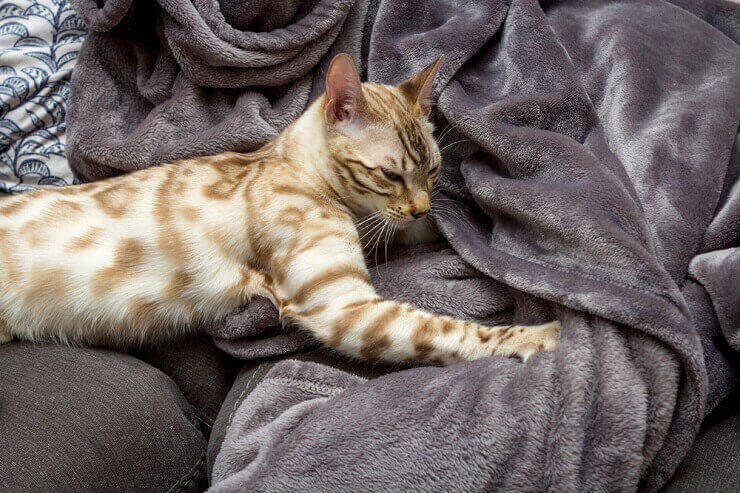
Sucking on blankets is pretty normal behavior for a cat, but that doesn’t mean there aren’t risks. Threads or pieces of fabric could easily be swallowed by your cat, especially if the blanket is old, damaged, or particularly fluffy.
These threads could get caught around your cat’s teeth or tongue, causing injury, or they could get stuck on their way through the digestive tract. This is known as a linear foreign body and can be very serious.
As the intestines move the lodged thread can cause them to bunch up, and even slice through the intestinal wall like a cheese wire. Therefore, it’s best to keep fluffy blankets or those with loose threads away from your cat.
Although nursing on a blanket is usually normal, any change in a cat’s behavior can be a sign of a health issue. So, if your cat never bothered with blankets before but is suddenly suckling on them a lot, it’s best to get them checked by a vet in case they are stressed, unwell, or suffering from pica.
When To See a Vet
It’s important to take your cat to the vet if they are acting unwell or their behavior has suddenly changed. If your cat is vomiting and unable to keep food or water down, it could be a sign that they have some thread or another foreign body stuck in their intestines.
They might also withdraw or vocalize due to belly pain, and you might notice them straining to pass poop. This could be a medical emergency so you should seek veterinary advice urgently.
It’s also worth booking an appointment to see the vet if your cat is drooling, gulping, bleeding from their mouth, or pawing at their face. These could be signs that a piece of thread is stuck in their mouth somewhere.
Also Read: What To Do If Your Cat Is Sneezing Blood
Can You Stop a Cat From Sucking on Blankets?
If your cat likes sucking on blankets, it’s normal behavior and often nothing to worry about. If it bothers you or you want to stop them, there are some things you can try. However, you might not be able to stop the behavior completely.
1. Provide Enrichment
If you keep your cat busy with other things you’ll alleviate boredom and it’s less likely they’ll suckle on a blanket. Giving them plenty of toys, puzzles, and other activities will direct their attention elsewhere. If you engage in playtime with them, they’ll have the added bonus of your company.
2. Provide Alternatives
Your cat might be suckling because they want to enjoy a cozy and loving moment with you. If you try to stop them without offering other opportunities for them to show their love, you might damage your bond. Make sure you give them plenty of cuddles and fusses when there are no blankets around!
3. Keep Blankets Out of the Way
It goes without saying, that if you don’t have any blankets out, your cat will find it harder to do this behavior!
Conclusion
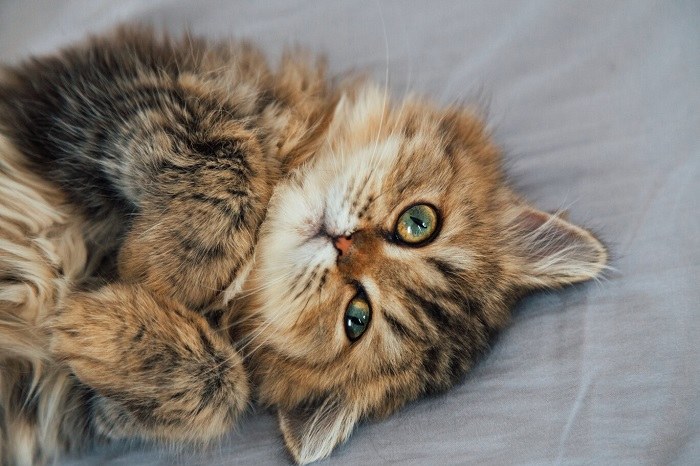
Most cats outgrow suckling behavior, but some cats still continue it into adulthood.
When you understand why cats suck on blankets, it probably doesn’t seem so weird. After all, it’s a behavior they will have done when feeding from their mothers as kittens. If it’s a new behavior, though, it’s worth seeking the advice of a vet or veterinary behaviorist in case there’s an underlying medical issue.
Also Read: The Complete Guide to Bottle Feeding Kittens
